Pat Williams
September 19, 2018
Pat Williams has been living at the intersection of Strongest Passion Street & Greatest Talents Avenue his entire career. He calls this location his sweet spot but I’d say he’s been living in the zone. If Disney made a movie about his career you may just think that it seems a bit far-fetched. From Hall of Fame catcher to Baseball Executive to NBA Executive, he has reached the pinnacle of each phase of his life.
The Dos Equis ‘Most Interesting Man In The World’ has gone into retirement because he caught wind of Pat Williams. Pat is extreme even for the modern day Renaissance Man. It seems like everything he does he does to the max.
Below are his accomplishments that will make you do a double-take. There’s no need for instant replay, they are all real! Let’s roll the tape …
- Wake Forest Collegiate Hall of Fame Catcher
- Minor League Baseball Executive of the Year 1967
- Author of over 100+ books
- A motivational speaker who has addressed thousands of executives
- Completed 58 marathons
- Parent of 19 children (including 14 adopted from 4 different nations)
- Co-Founder of Orlando Magic
- Innovator of 1st NBA mascot, Benny the Bull
I’ll admit. After reading this list, I fell into a slight haze of underachievement and ineptitude. You may be getting that feeling as well. If any person did just one of those things, they’d probably hang their hat on it their whole life, but Pat kept going and going and going.
A life so fully lived isn’t without challenges. In February of 2011, Pat was diagnosed with Multiple Myeloma, an incurable form of cancer. However, after several rounds of chemo, Pat’s doctors have told him that they are unable to detect any myeloma in his body and have given him a clean bill of health.
Interviewing Pat Williams absolutely epitomizes the key reasons I started this blog: 1) to meet interesting people I’ve always wanted to meet and 2) to uncover what makes this seemingly super-human quite real, and 3) to help you understand how to unlock the potential to be outrageously remarkable in your own way. Let’s head down to the home of the Orlando Magic to find out more …
[Setting: When you walk into the Amway Center’s atrium, one of the first things you notice is an iconic 90s picture of Pat Williams kissing an Orlando Magic draft lottery ping pong ball. When you are making your way towards the exits after a Magic game you will often see him, which is why it is perfect that we met here for the interview. It’s a building that his stamp on it.]
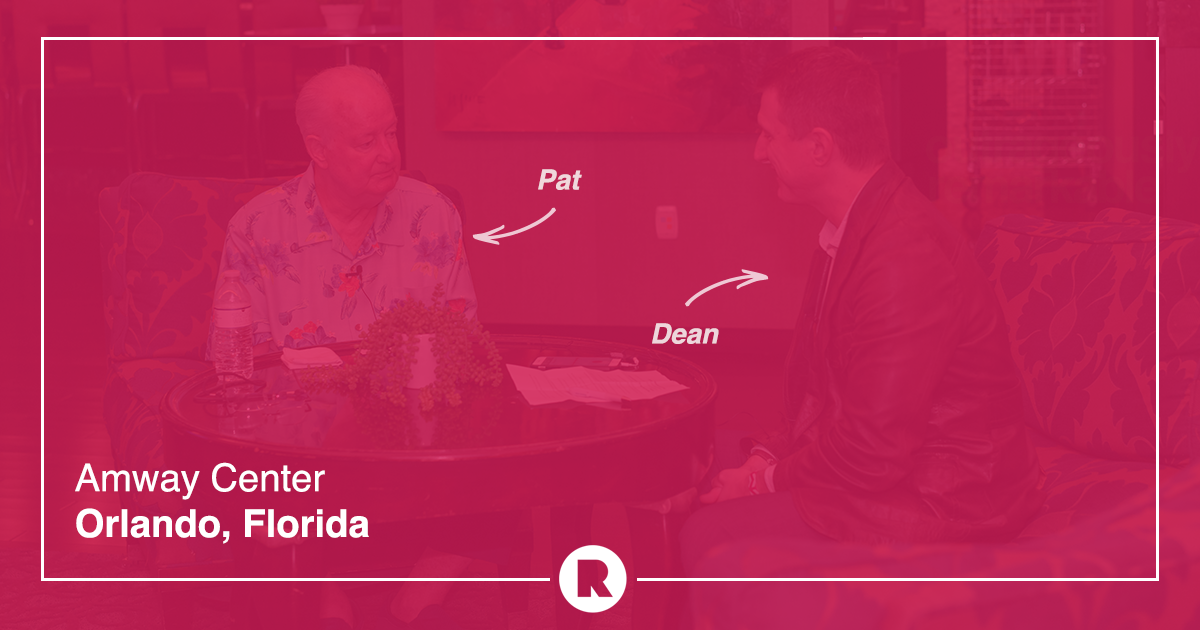
Dean: Alright Pat, so it’s funny, yesterday I got a call from a friend of mine and he said he wants to write a book, but that it’s a lot of work and he’s not sure if he has the time for it. I’ve heard a lot of people mention that and I hear it all the time. I want to know, how did you find the time to write 100 books and run 50 marathons? I’ve run two and the training involved in that was a lot. How did you have the time to do that?
Pat: Well, I think it comes down to priorities and what’s important to you. I’m not a golfer, I’m not a fisherman, I’m not a stamp collector, my life is pretty simple. I read a lot, I write a lot. Before my cancer diagnosis eight years ago, I worked out and I ran marathons. That was about the extent of my life other than children and grandchildren and my work with the Magic. It’s amazing what you can do in 16 hours a day, I’m accounting the other eight hours to sleep, but in 16 hours a day if you don’t waste any time, and keep the television set off. The average American watches four hours of television every day. There’s nothing wrong with television, but if you want to get things done that are important in your life, the time is there.
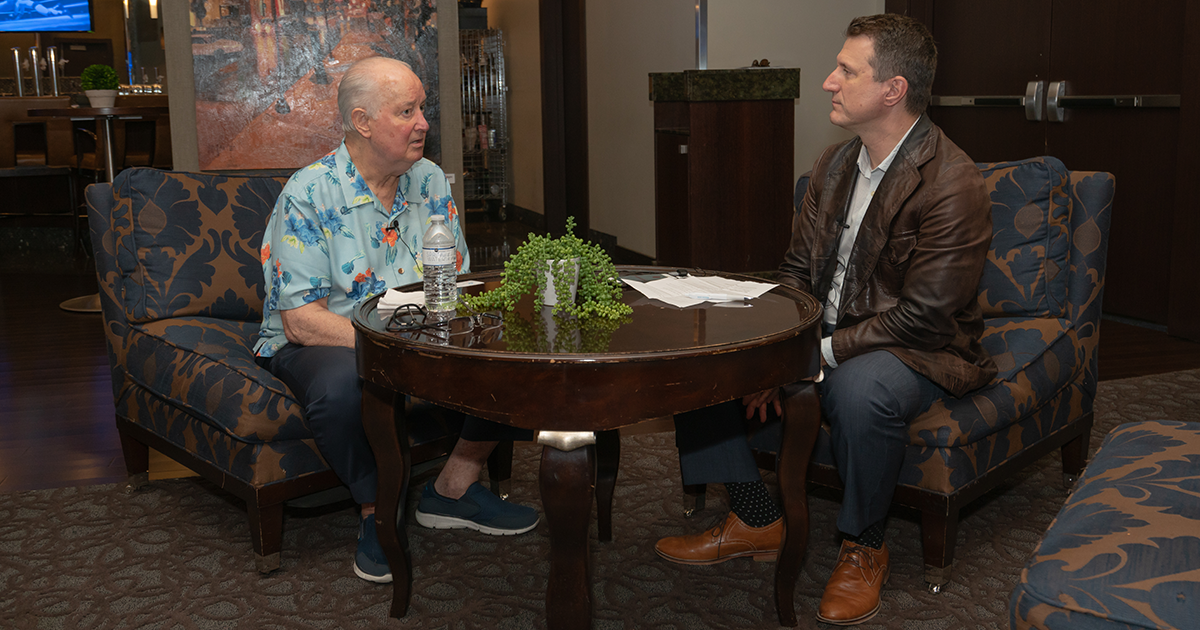
Dean: Do you watch television? How do you consume news and events?
Pat: I’m a newspaper guy. I still am. I have five newspapers that come to my driveway every morning, so before my day starts, I’ve got to dive into my newspapers and that’s been the way I have lived since I was seven-years-old.
Dean: Okay, so you’ve been a voracious reader your entire life.
… that should help trigger a reading instinct …
Pat: Yes, I became a voracious reader at age seven when I fell in love with baseball and I wanted to know baseball and I wanted to learn the game. I was fascinated by it and so I started reading. When parents tell me that they can’t get their kids to read, I say to them, well, what are they interested in? What do they love to do? What really excites them? That’s what you want them to be reading. Don’t force stuff on them that they don’t have any interest in. I mean, I wouldn’t read either if you were forcing me to read about ancient history, or the great philosophers of the world, or how to be a French cook, or how to raise great roses. So, find out what your child has an interest in and that should help trigger a reading instinct so they can learn about what they have an interest in.
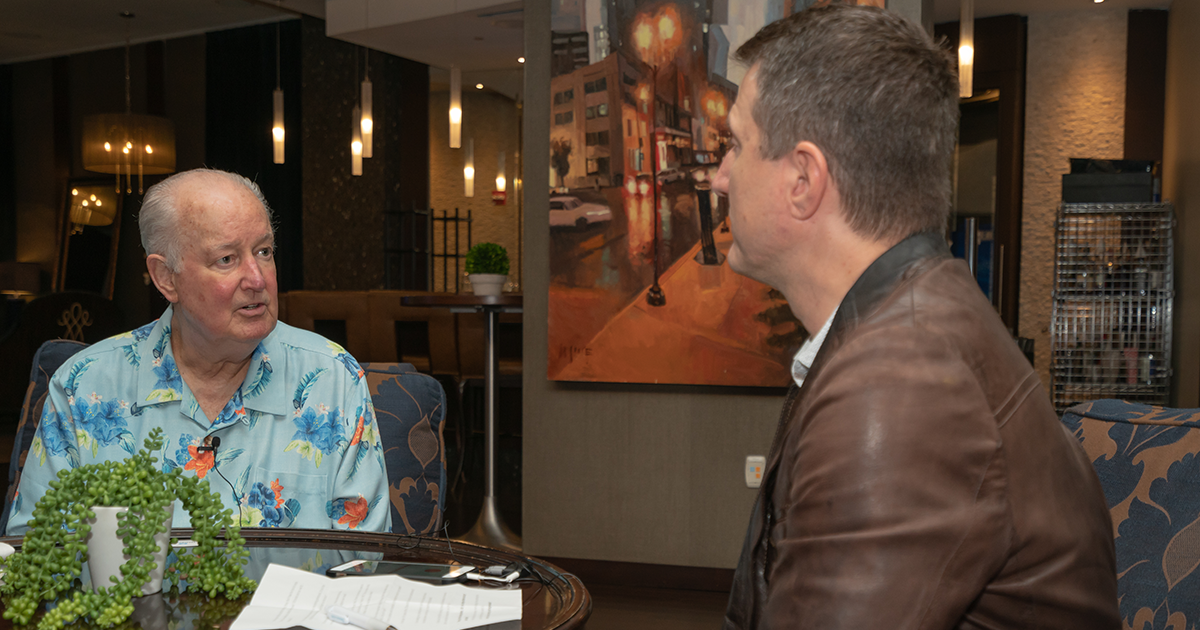
Dean: About writing, so I haven’t written a book yet. I’m a recovering perfectionist, but I plan on writing a book. Do you have any tips on how to select a topic and actually finish writing a book?
Pat: I wouldn’t even think about writing a book unless there was a passion, you know, a real fire burning within you that is just dying to get out. You can’t invent that, you can’t create that, but for those that come to me and say, “I have a book inside of me, what do I do?” I just say write the book.
I was 29-years-old at that point and became the GM of the Bulls.
Dean: Just let it out?
Pat: Yeah, write the book. They want to know all of the steps involved and the biggest step is that you have to write the book. Getting it published is the easy part. I tell them that you write the book one page at a time, one page a day. If you can write one page a day, in one year, you’ll have 365 pages written, which is probably too many, but it’s a lot easier to trim down than to build up. I tell people to sit down and write one page a day. Don’t go beyond that or you’ll exhaust yourself. When you’ve written the book, come to see me and then I’ll tell you what the next step is.
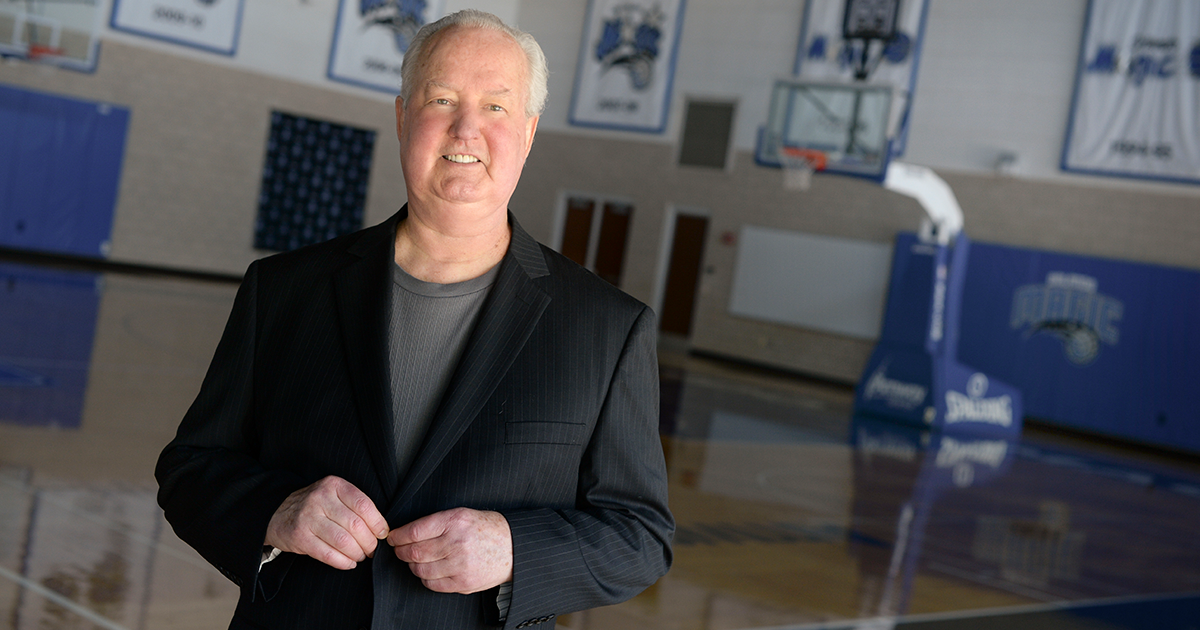
Dean: Okay, I’m going to do that. I’ll come see you after I write the book.
Pat: You do that. Now, if you don’t have the ability to write well, hire a wordsmith or hire a writing partner. You don’t want to write if you’re not that good at it because someone is going to have to clean it all up, so you’re better off hiring a wordsmith to work with you so that as you go through it, the book is well written from the start. There are lots of things I’ve learned about putting a book together. Once it is written, there are many different ways of getting it published. As I said earlier, that’s the easy part.
Dean: You spent several years in the U.S. Army. What lessons from that experience have you carried throughout your career?
Pat: Well, I went into the Army Reserves when I was 24-years-old. This was right at the height of the Vietnam War so there was an awful lot of pressure and concern with young men between 18 and 25. Lots of concern. I was working for the Philadelphia Phillies organization at the time and they got me into an Army Reserve Unit in Philadelphia. I had to do 16 weeks of Basic Training in the fall of 1965 in Fort Jackson and then eight weeks at Fort Polk in Louisiana. I still have vivid memories of the whole thing. And then there was like a seven-year commitment in which you had weekend responsibilities. There was a summer camp each summer, but it allowed me to continue my work in the Phillies organization and it was best for me. That was the best situation for me. I still have vivid memories of the entire experience. I’m proud that I did serve. It wasn’t easy, I wasn’t particularly gung-ho about the whole thing at the time, but as I look back now, it was an important experience in my upbringing and in my life.
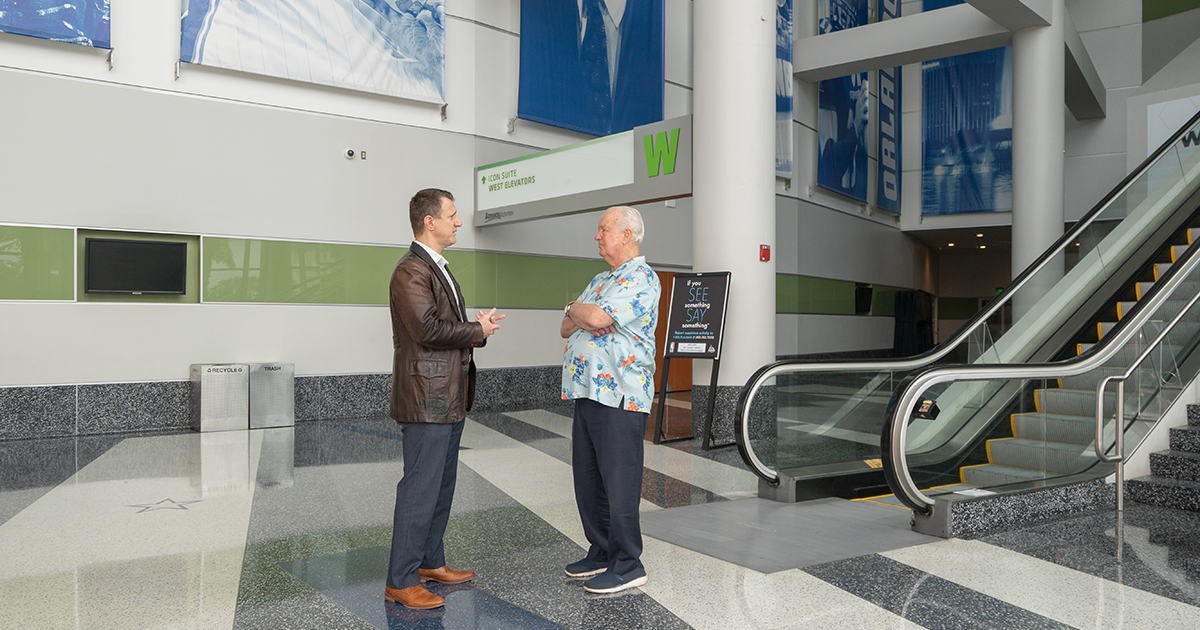
Dean: You mentioned baseball. It took you less than three years to go from your front office role to being the Minor League Executive of the Year according to Sporting News. Can you share what you did to obtain such rapid success as a leader?
I believed very strongly in promotion …
Pat: Well, my background in baseball was as a catcher. I was a ballplayer, I played at Wake Forest. My first two years, I was a catcher in the Phillies farm system in Miami, which was one of their clubs in the Florida state league at the time. A marvelous experience. I look back to the fact that I was able to wear the uniform and ride the buses and see what the life of a professional athlete is. It was an awfully important experience in my life. The Phillies saw a better future for me in the front office and gave me opportunities, which lead me to Spartanburg, South Carolina, where I was the General Manager of the Phillies club. I was 24 at the time when we started. I was very aggressive, I believed very strongly in promotion, getting people into the ballpark. Bill Veeck, the great baseball marketing genius was an idol of mine and became a mentor. I kind of followed his path. In other words, anytime there was a ballgame at beautiful Duncan Park in Spartanburg, we wanted it to be a marvelous experience, a night of great fun, and good baseball. Fortunately, the Phillies sent us really good teams, championship level teams, with future major leaguers. Every night, we were doing something to entertain our fans or lure them into the ballpark, so I got some really good lessons about marketing and that has carried me through all of these years in basketball now. It’s really given me a good foundation.
Dean: I’m getting the understanding that it’s more of an experience, an event, rather than a game. When you said aggressive, it sounded like you were really pushing more towards the cutting edge by thinking of what you can do at a game. I think I read that you were involved in the origins of Benny the Bull for example?
Pat: Well, that came later. After I left the Phillies organization and moved into basketball 50 years ago, I spent one year in Philadelphia with the Sixers as an assistant to Jack Ramsay, who was then the coach and GM. Then, in the summer of 1969, we moved to Chicago. I was 29-years-old at that point and became the GM of the Bulls. Again, that was a franchise that had really struggled. They really had a hard time drawing people and really being accepted in the city of Chicago, so we took many of those principles from minor league baseball and applied them in Chicago. One of them was to create a mascot. The first mascot I think in NBA history, I think it was the fall of 1969, and so we had a company that designed a costume, a big red suit with a bull’s head, that we named Benny the Bull. Benny Bentley was our PR guy and we were on tight timelines, so I just said alright Benny, we’re naming him after you and darn if it hadn’t stuck all these years. Fifty years or so and Benny the Bull is still a big part of the Chicago sports scene.
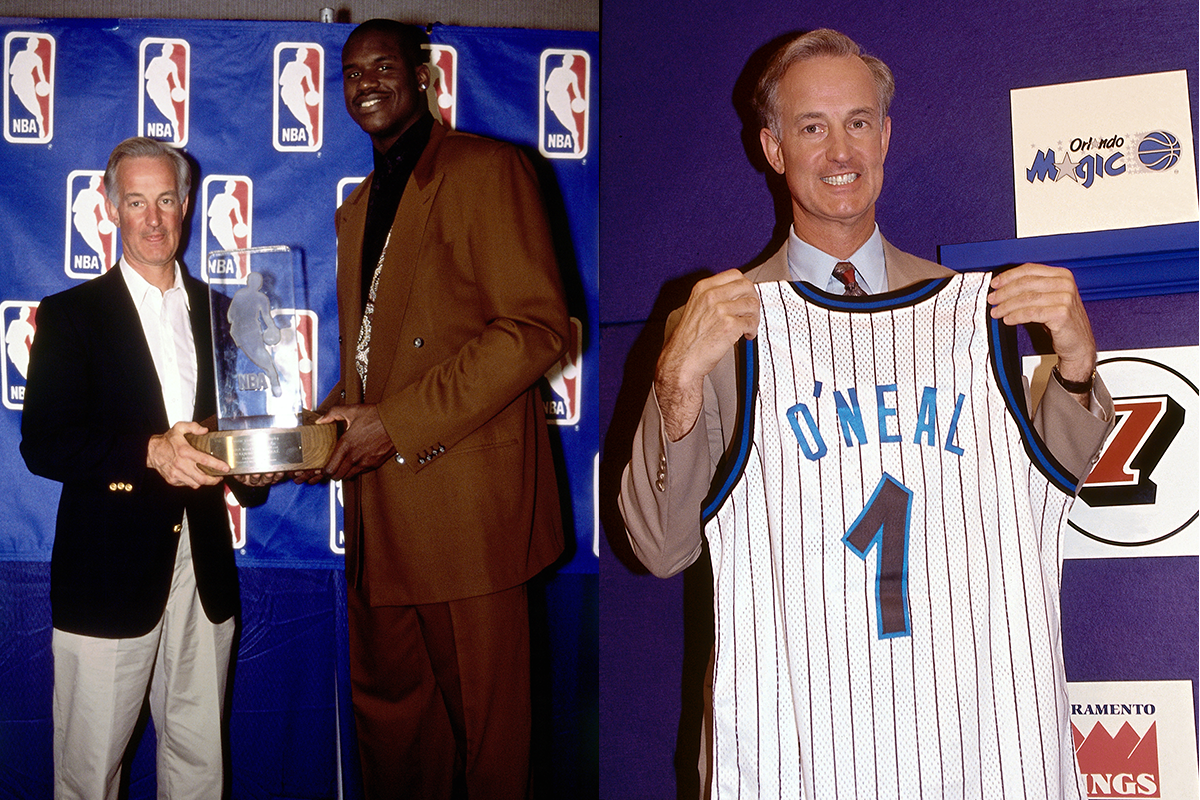
Dean: That’s awesome. What was the reaction the first time that people started to hear that there was a mascot and that it had a name? What was that like?
Pat: We had a big job of trying to attract more fans to the games in Chicago, but Benny went over well. He was very active. It was a Chicago businessman that we stuck in the suit. It was not a trained guy. Now, they hire a gymnast who’s gone through years of training before getting into the suit, but in this case, we just dragged a guy from behind his desk and said wear this for one night. Four years later, he was still in it, but I think our fans enjoyed him. He became quite an entertainment piece and I think our fans got a big kick out of him.
Dean: Switching gears a little bit, what is the most important quality that you think many leaders lack in today’s day and age?
From George Washington to Abraham Lincoln to Churchill …
Pat: Any leader must have vision. A leader must know where he or she is headed. They must have a definite goal and a very clear picture of the finished product. Then, working backward, putting the pieces in place to turn that vision into a reality. I think that’s the heart and soul of leadership. When you study any of the great leaders of history, they were all visionaries. From George Washington to Abraham Lincoln to Churchill, Martin Luther King, Ronald Reagan … Walt Disney, who still impacts our lives every day here in Orlando. They were visionaries who saw where they were headed, they never were diverted, and they had tremendous focus because of that vision. They had a tremendous passion and energy and above all, they were finishers. At the end of the day, leadership is always about results. It’s always about producing wins or triumphs or successes, but everything in leadership begins with a vision to see things that others don’t see. To see before others, to see in a wider scope than others … I think that’s what visionary leaders are able to do.
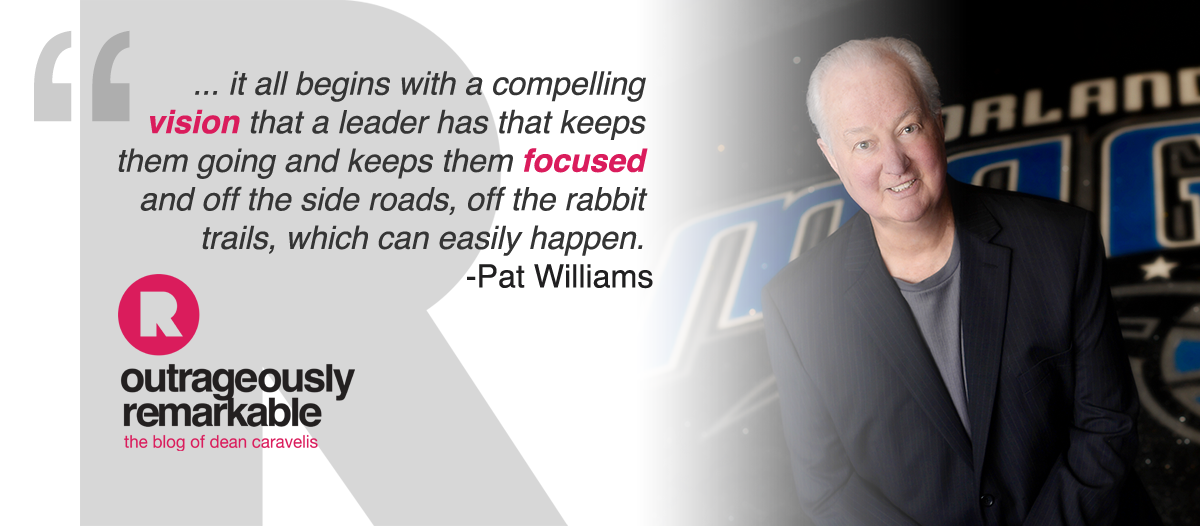
Dean: I like that you use the word ‘finishers’ because there are so many people that are very good at starting, but getting it over the hump and actually finishing or accomplishing things without getting distracted, without losing sight of what the end goal was or changing it, I think is really key.
Pat: You phrased that well. Leaders are measured by how well they finish. Let’s face it, leadership is not easy. There are enormous obstacles, there are great mountains to get over, valleys to navigate, long stretches of desert that leaders must deal with, but if that vision is so compelling, if it is so crystal clear in their minds, they’re going to hang in there. They’re going to keep persevering and they’re going to get the ball into the end zone, if I may use a football term. That is a huge part of leadership, but it all begins with a compelling vision that a leader has that keeps them going and keeps them focused and off the side roads, off the rabbit trails, which can easily happen. It keeps them filled with fuel. Listen, if the leader is not passionate, if the leader is not excited, if the leader does not have great zeal and zest for what they’re doing, guess what? Nobody else is either and therefore, a leader has to stay pumped up and enthusiastic through any endeavor.
We all need mentors in our life, every one of us.
Dean: Pat, is there a person who has impacted the trajectory of your professional career the most?
Pat: I was very fortunate when I was in Spartanburg with the Phillies farm club there that the owner of the team, a businessman named R.E. Littlejohn, a very wealthy, successful businessman who owned the team and loved baseball, but he was a man of strong Christian faith, great values. He had a wonderful quality called wisdom. He took me under his wing. I spent four years with him running that baseball team, but he was bringing life lessons into my world almost daily, certainly weekly. To this day, he still impacts me, even though he passed away years ago. When I left Spartanburg after four seasons, got into the NBA unit, there was hardly a month that I didn’t talk to him, that I wasn’t on the phone with him, seeking wisdom or council about something that was going on either in Philly or Chicago or Atlanta. I was constantly reaching out to him to seek his wisdom. I was very, very fortunate. We all need mentors in our life, every one of us. I was very blessed to have a mentor who came into my world when I was very young, just starting my career, and he formed and helped shape my approach, which still carries on to this day 50-some years later.

Dean: We were talking earlier about the Orlando Magic. We’ve had a couple of great championship finals runs and aside from the entertainment and the games, the amount that this team has been able to impact the community has been tremendous. I think I mentioned to you earlier that my company has been a vendor of the Orlando Magic for eight years now. I thank you for your vision, for having the vision to come here and help establish the team. What’s your favorite memory with the Magic?
So, I think our timing was perfect to get that franchise in a fairly small community.
Pat: Well, there are many memories. It all started 32 years ago. The summer of 1986, when we announced that we were going to try to bring an NBA team here, an expansion team. It was very competitive, other cities were doing the same thing. The news in April of 1987 that we had been awarded a franchise was an exhilarating moment. We’ve had many highs, a couple of championship runs. We’ve had our share of lows, but that’s all part of basketball as well, but I still enjoy it a great deal. I still enjoy the game, I still enjoy the athletes, I enjoy the enormous growth of the NBA as an international sport. I started in 1968 and at that point, the league I guess was 22 years old. That still staggers me. The NBA was started in 1946 so if I came along in 1968, I think that was just 22 years. Think about that for a minute. So, I have seen this enormous level of growth and internationalization of the game. It still kind of staggers me and it’s kind of still in its early stages. There’s no telling what this sport is going to be like in 20 years, so I feel very, very fortunate that we were able to grab a franchise at the right time. When we came in, the expansion fee was 32.5 million dollars, which our ownership group could afford at that point. Teams are now selling for two billion dollars or so. We could never come into the league now, it would be impossible. So, I think our timing was perfect to get that franchise in a fairly small community. When you think about Orlando in the mid-80s, it was a far cry from where we are today. I still feel that it was almost miraculous what happened here and that we were able to get that franchise and then see it grow … see the community grow. Orlando now is just a boom town. It still staggers me what’s going on in this community and there’s no end in sight. The Magic have been a big part of the growth and it will continue that way. We’re here for keeps and we have great ownership in the DeVos family who are totally committed to this community, so the future is bright for us.
Dean: I have to say, I always smile when I see you greeting fans at the end of games when they’re leaving. I wondered, when did you start doing that and why?
Pat: Actually, I started way back in the minor league days in baseball when I was in Spartanburg. I would stand at the main gate when the game was over and greet our fans as they were leaving. I continued through my days in all of the NBA cities where I have been and just to thank people for coming, answer questions that they might have. If someone wants to snap a photo of whatever, that’s fine. So, it’s just a personal touch I think that might add just a little extra to the evening and many times, we will have groups of fans from other countries. Brazil and other South American countries, groups from England, so I always enjoy reaching out to them.
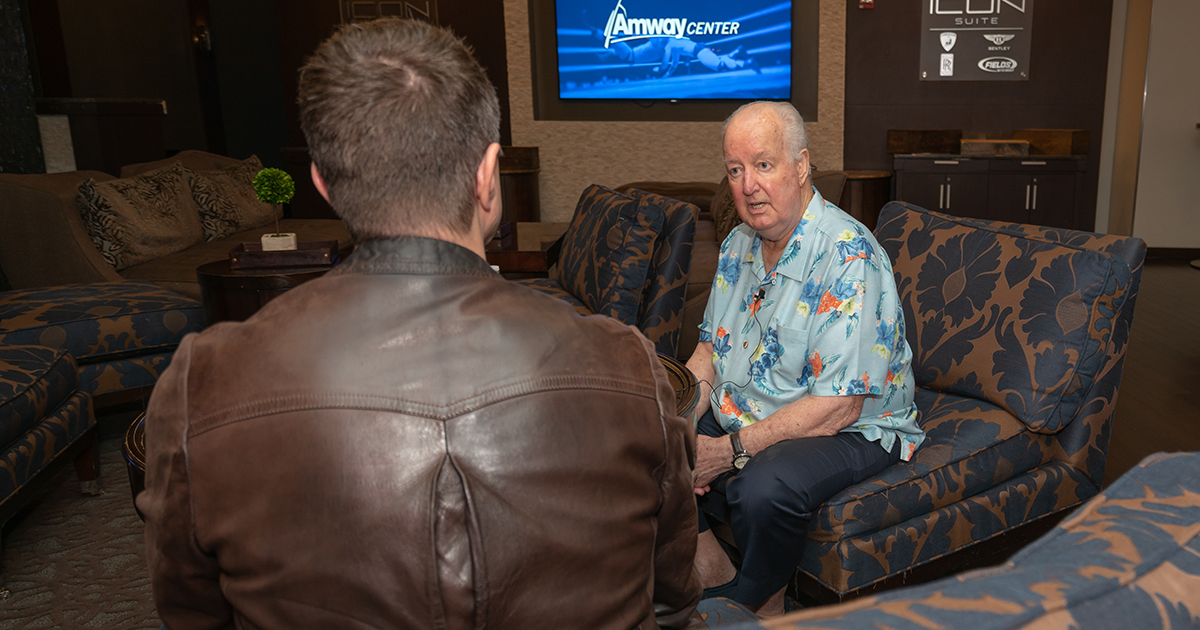
Dean: I think it’s a great way to show gratitude to fans for coming out. I think it’s a wonderful way to connect with fans. Like you said, you become very accessible.
Pat: I mentioned Bill Veeck earlier, the great baseball promoter, he had a big influence on me, and he believed in being accessible. He answered his own phone, he opened his own mail, he would be roaming around his ballparks talking to the fans, he would be out in the community speaking at different events. He just thought it was important to be out there and available to fans, so I bought into that very, very early in my career and have continued it all. I pick up my own phone and open my own mail and make it easier for people that want to get a hold of me.
Dean: That’s a wonderful philosophy. If you can comment on this, it looks like the NBA is moving towards the elimination of the ‘one and done.’ What’s your opinion on that?
Pat: I’m not sure where all that will end up, but I do know that Commissioner David Stern was adamant about getting NBA scouts out of high school gyms and so he worked very hard at ending the high school kids coming into the pros even though many of them did very well, be it Lebron James or Kevin Garnett or Dwight Howard. There were many who did extremely well, but it was collectively bargained and the deal that was cut years ago was that a kid would have to be 19-years-old or finish his first year of college. It came to be nicknamed the ‘one and done,’ but listen, it’s a lot better than trying to scout or evaluate a 17-year-old high school kid. You know, we get a full year to look at kids in college. They do get one year of experience on a college campus. We all wish it was two or three, but at this point, that’s what has been bargained and that’s where we stand. Do the colleges like it? Probably not, however, at least they get one year from these young players representing their school rather than zero years if they were going directly from high school to the pros. So, I think that it hasn’t been the worst thing in the world. It’s been pretty good. Can we ever get two years? That would be fine. I don’t know how it’s all going to end up, but this is what we have and we live with it.
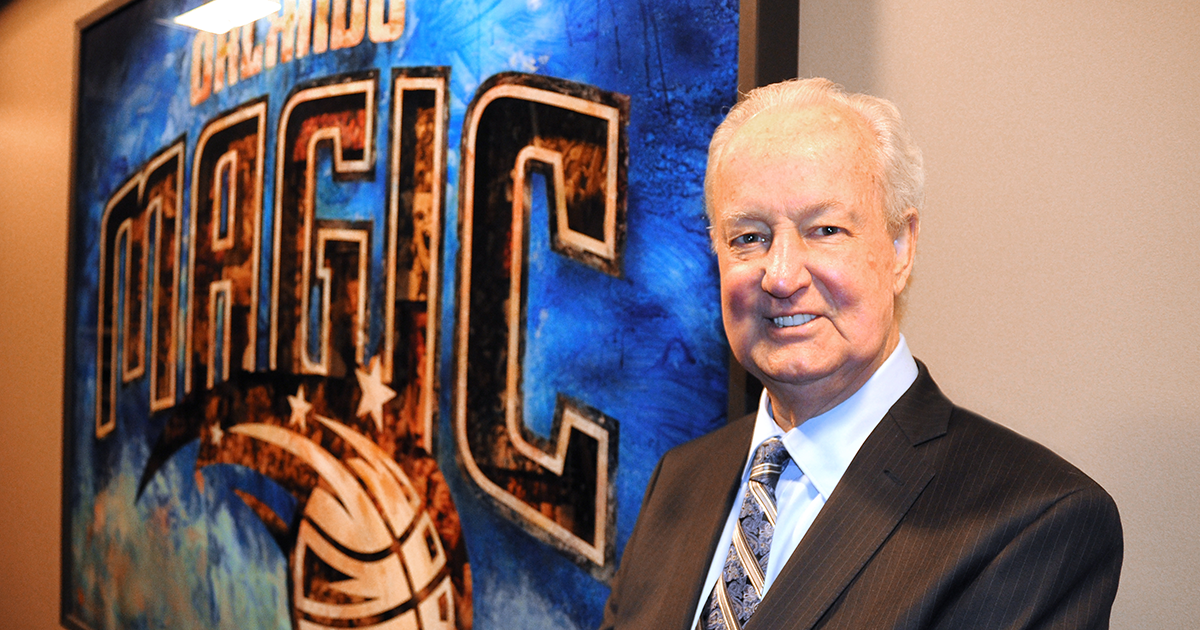
Dean: Now, you’re a former college athlete who is actually in the Hall of Fame for your alma mater for baseball. Do you think that a college athlete should get paid?
So, do they all have agents?
Pat: No, I don’t know how you’d ever administrate that. The scholarship and whatever extra you get paid along with it is pretty valuable. How you would ever figure out how you would pay college players, from the starting quarterback to the fourth quarterback to the soccer team? I mean, how would you figure all that out? To me, it would be an absolute nightmare. I would say no. Leave it alone. College sports is doing very well, it’s very productive and valuable. Yes, there’s lots of money in college sports and many of the athletes are saying that they should get a part of it, but I don’t see how in the world you would ever figure all that out. It would take a lot of brains to do that. We have enough issues negotiating with 12 basketball players let alone on these big campuses with men and women’s sports and they have 400, 500 athletes or more. Swimming and volleyball and on and on it goes. So, do they all have agents? Does football and basketball get more of the load financially? You can imagine all of the screaming and hollering over that one. Do women basketball players get paid the same as men basketball players? I would want no part of that.
Right now, we have 17 grandchildren
Dean: [laughing] I’m buying into your case. I think it’s a question that’s been asked and talked about, but parsing out the details is way different. Looking at your biography and reading about all of the amazing things that you’ve done, I have to ask, is there anything left on your bucket list that you want to do?
Pat: Right now, we have 17 grandchildren. The oldest is about to turn 14. I am very eager to keep investing in their lives and to see how all of that turns out. That’s very important to me. Maybe at this point, another dozen or so books that are in the pipeline.
Dean: They’re burning to get out?
Pat: Yes, they are.
Dean: One at a time?
Pat: Well, we’re kind of packaging them up, pitching two new ideas to one publisher. We’re going to pick a package of four more book ideas to another one. So, there are still books that are there within, waiting to come out. I still very much enjoy my basketball life and I’m eager to see the Magic return to some glory days. So, no, there’s no lack of things that keep me going. I have no retirement plans. I’m doing now what I would be doing if I was retired. Reading, writing, being involved with the basketball team, speaking, so no, I’m not the retiring type. I’ll be doing this as long as the Lord gives me health.
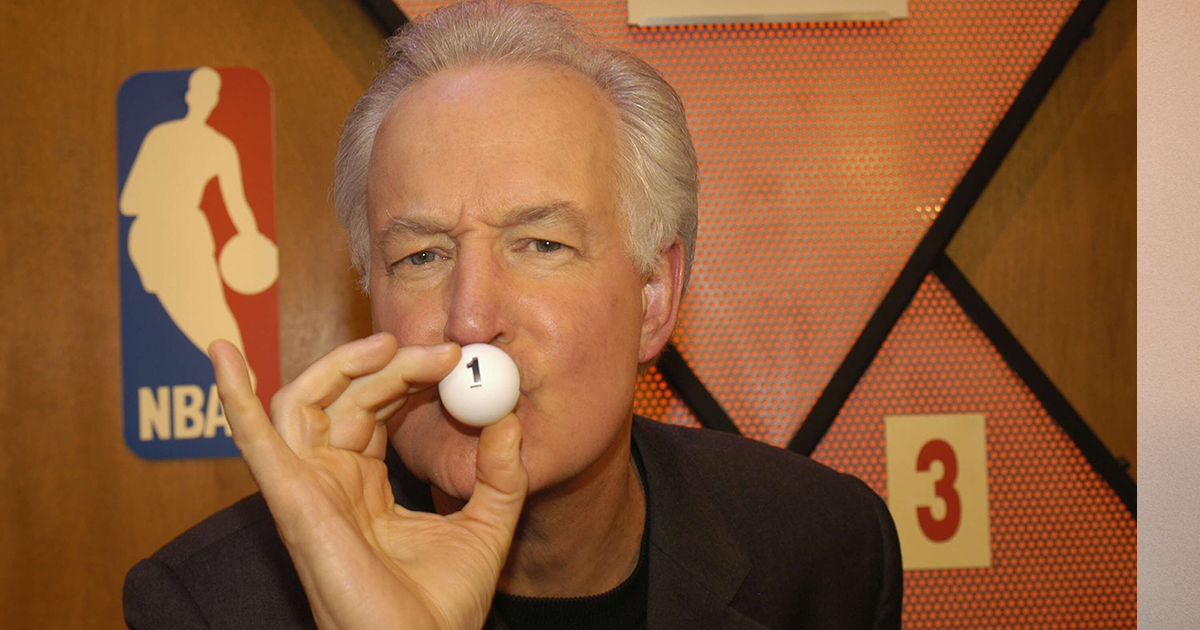
Dean: So my blog where this interview is going to be posted is called Outrageously Remarkable. I ask this question at the very end and it’s sometimes difficult for people to answer because it requires you to look at yourself from the third person and just remove all of your humility. I wanted to know, what is your secret to being outrageously remarkable?
You’ve got to be a very wise and thorough student of your children.
Pat: I figured out years ago that when your greatest talent intersects with your strongest passion, that’s the sweet spot in your life, right there where those two intersect. I’ve been very fortunate to be living right there in the center of that sweet spot my entire life and getting paid for it every two weeks. That’s important. I found out early on that my talent was administration. My talent was talent evaluation. My talent was leadership … and my passion was sports. Baseball initially, basketball, you know that’s really my greatest interest; my greatest passion that gives me enthusiasm every day, even to this day. So, I think that’s the secret. When you can figure out what your best talent is and then figure out what you’re excited and enthused about, that’s where you want to stay. I caught that idea way back when I was very, very young, maybe as young as seven. When I saw my first major league baseball game in Philadelphia, I knew then what I wanted to do with my life, I wanted to be a ballplayer. And I was, which lead to a career in the front office, which is where I’ve been going back 71 years.
One of the great lessons I give to parents is that one of your main jobs in parenting is to get your kids thinking about what it is they love to do and what they’re good at. Start talking to them about their future at a young age and what they can do with their life. You’re not too young to get rolling on that. I’m living proof of that. I see people in their 20s or 30s who are still trying to figure out what they want to do with their life or what they should be doing and I tell parents, don’t let that happen. Start working on it when your kids are very, very young. They will ask how they’re supposed to do that. Well, you take them and exposing them to everything that you can. Sports, theater, music, computers, art, pottery, I mean everything imaginable. You get them exposed to everything and they’ll tell you and they’ll show you what they’re good at and more importantly, they’ll tell you what they like to do. And if you’re dragging them to gymnastics with a kid kicking and screaming, it’s probably not going to work. If they can’t wait to get to the swimming pool for swimming practice, then that’s where you want to be leaning. You’ve got to be a very wise and thorough student of your children. You’ve got to be the world’s leading authority on your children and grandchildren.
Dean: Well, I’m sure my readers are going to be thinking about where their sweet spot is and I truly appreciate your time today and your inspiration. Thank you.
Pat: Good Dean, nice to talk to you. Thank you.
____________
It should be noted that since we conducted this interview Mr. DeVos, owner of the Orlando Magic, has passed away on September 6, 2018. My deepest condolences go out to his family, friends & the team.
To connect with Pat Williams check him out on Twitter (he likes to share inspirational content!)
A special thanks to Andrew Herdliska for helping me coordinate this interview!
Thanks to Joshua Johnson, check out his photography work here.
Want to keep up with this blog? GREAT! Subscribe here to be an insider.